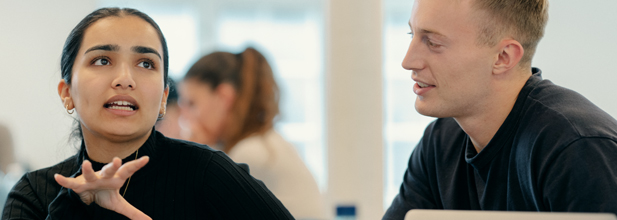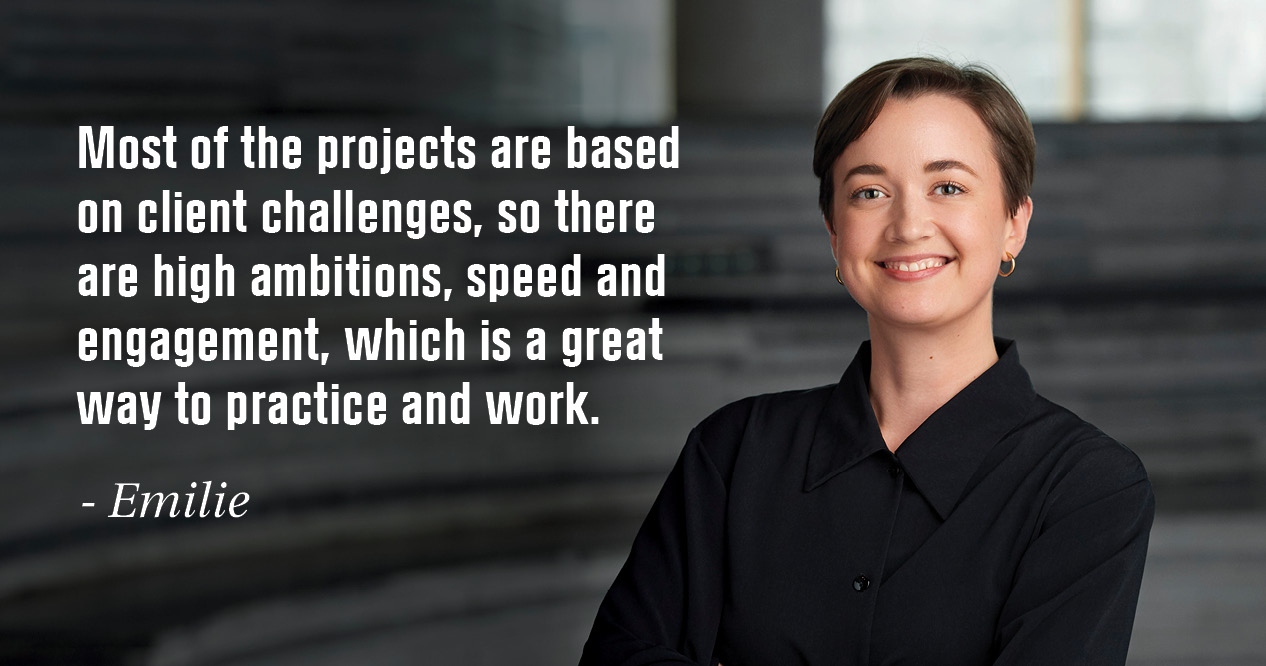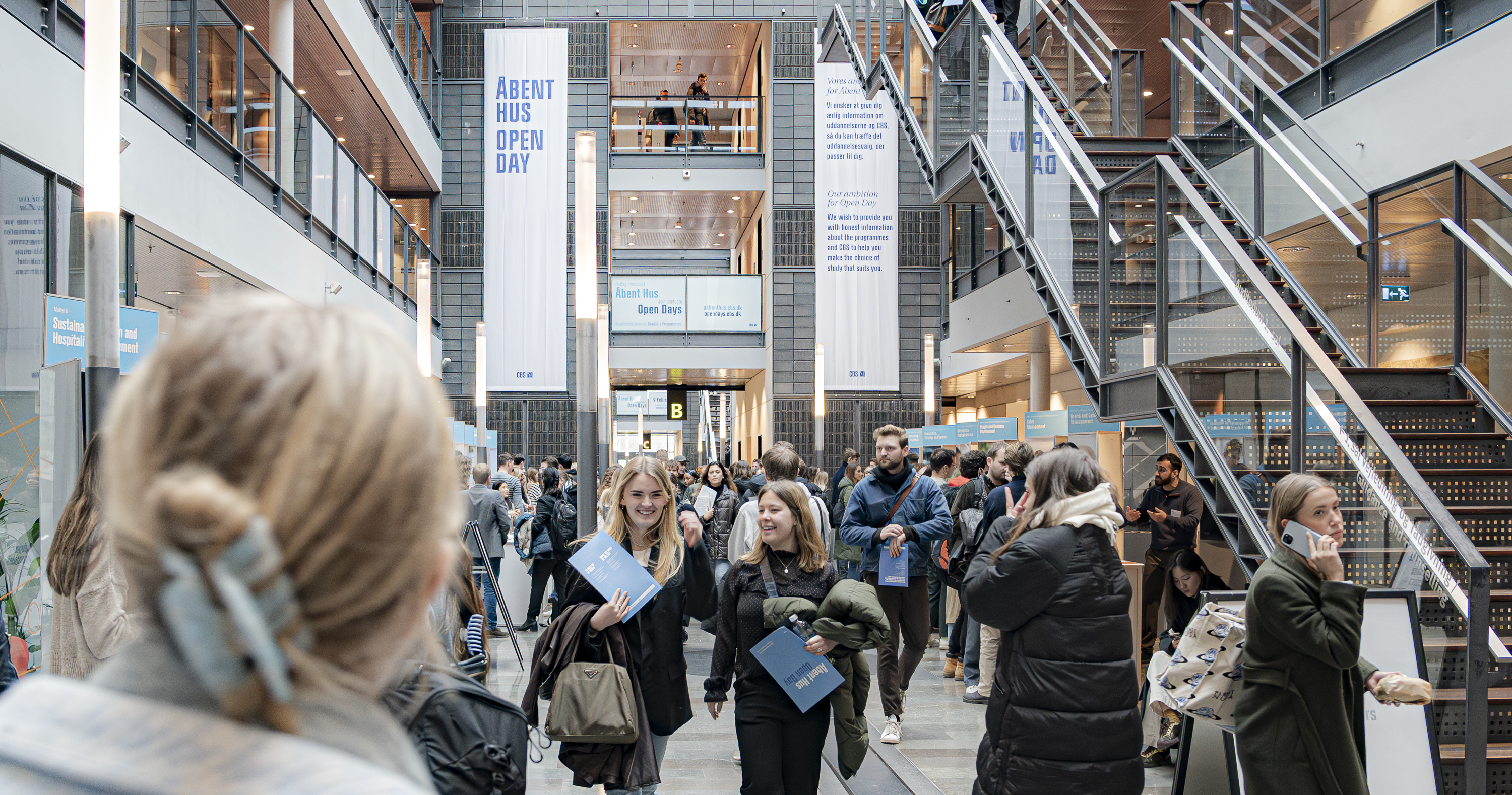MSc in Social Science - Strategic Design and Entrepreneurship
About the programme
Joint master programme
Strategic Design and Entrepreneurship, SDE, is an interdisciplinary master’s programme, jointly offered by CBS and the Royal Danish Academy of Architecture, Design and Conservation.
CBS and the Royal Academy in collaboration provide teaching, supervision, space, worskhops, materials and exams and students will be taking classes and doing project work on both the CBS Frederiksberg campus and on the Royal Academy campus at Holmen, Copenhagen.
Innovation and design
The programme provides students with critical skills and deep knowledge of entrepreneurship, innovation methods, design processes, business development along with cross-domain collaboration, communication and management.
A main feature of the programme is the commitment of enrolled students to collaboration and active learning. This entails extra-curricular events such as innovation sprints and participation in design and architectural competitions and exhibitions.
Hard skills and soft skills
SDE brings students of business, design and architecture together. The aim is to transform the creation of value through architecture and design towards socially and environmentally sustainable forms of business and organising.
You will be trained in hard skills:
- entrepreneurial finance
- accounting
- legal strategy
- business ethics
- design management
- research methods
The hard skills are combined with soft skills:
- cross-domain collaboration and communication;
- active listening
- problem-solving abilities
- teamwork and time management.
This combination will prepare you to professionally address business challenges relative to environmental change, new technologies that all industrial sectors, including architecture, design and construction, are facing.
Interdisciplinary student environment
Business students are enrolled at CBS while students with a bachelor in architecture or design are enrolled at the Royal Academy.
In the 1st year, the two cohorts take classes together and work together in teams across institutions to create solutions to industry partners’ business challenges that groups are assigned with.
In the 2nd year student collaborations across the institutions are self-organised for example in entrepreneurial collaboration under the auspices of the Copenhagen School of Entrepreneurship.
Collaboration with external industry partners
In the Strategic Design and Entrepreneurship programme we collaborate with external partners from industries ranging from architecture, construction and design to healthcare, finance and manufacture, making sure students get experience with real-life business challenges and stakeholders within a framework of ethical standards. Partnerships with industry take place on three levels: year-long collaborations, providing design and business challenges to student teams and participating in design sprints.

Customise your programme
During the programme, you have various opportunities to create your own academic profile.
Electives
On the 3rd semester, you can choose to study courses of your specific interest. CBS offers a large number of electives within a wide range of topics. You can also choose to take electives at other Danish universities. The electives you choose have to be relevant for your programme.
See the current selection of CBS electives on Single courses and electives - Master
Minor
On the 3rd semester, you can also choose to study a so-called minor. A minor is a package of electives within a specific academic area. Typically, it consists of 3 courses. By taking a minor, you strengthen your competences within a specific area of interest, and you can use it to qualify for specific jobs or industries.
See the current selection of CBS minors on Minors
Exchange
Many students choose to go on exchange on their 3rd semester; usually at one of CBS’ more than 300 partner universities. When you go on exchange through CBS, you do not have to pay for the teaching at the foreign university (with a few exceptions), and you can bring your SU (student grant).
Find a list of all CBS partner universities here
Academic internship
You can choose to replace some of your electives with a so-called academic internship. The academic internship consists of an internship period at a company, which is then completed with a project report. You can do the internship at a company in Denmark or abroad.
When doing an internship you get the opportunity to relate theory to practice and reflect on the academic training you receive at CBS in a practical setting. Therefore, the project report and work assignments during your internship have to be relevant to your study programme.
Master's thesis
Your 2nd year is completed with a master's thesis. You choose the topic you want to write about, which allows you to focus on a specific topic of your interest. Typically, you write your master's thesis with a fellow student.
What to consider
Entrepreneural activities
All CBS students have access to a specialised career services.
The student incubator Copenhagen School of Entrepreneurship (CSE) gives you an important networking opportunity and you can use the financial, intellectual and institutional support of CSE for your own entrepreneurial activities.
Studying in English
If you do not have a bachelor’s degree taught in English, we recommend that you read more about what to consider before applying for an English taught programme.
Study environment
The study environment is vibrant, committed and caring. The student cohort is international and multi-disciplinary with a drive for collaborative problemsolving and active learning.
Students work together to organise and participate in business sprints, exhibitions and in design and architecture competitions.
Student life at CBS
Studying at CBS is much more than just preparing for and going to classes.
At CBS, there are more than 20,000 students with different backgrounds and nationalities. Teamwork is an essential part of studying at CBS both in classes and in extracurricular activities.
With more than 100 student organisations, you also have plenty of opportunities to engage and connect with students across programmes and classes.
Learn more about the vibrant student life at CBS, the student organisations, and the international environment on Student life
For internationals
If you are an international student, we have gathered a lot of information about what it is like to be an international student at CBS and how you can prepare for life in Denmark.
Read more on For internationals
Teaching and exams
Teaching
Classes at CBS are lectures and we use the Harvard “case method”, which involves high-energy discussions, debate and interaction. Students are encouraged to bring their own views into discussions, to share learning with fellow students.
Studio classes take place both at CBS, in a specialised training facility, and at the Royal Danish Academy on Holmen, Copenhagen.
Classes at the Royal Acedemy are structured as alternations between theoretical input, academic analysis, conceptual development, prototyping, co-creation and interaction with entrepreneurs and stakeholders from the architecture and design industry. We often use The British Design Council's Double Diamond process model for design.
Design-oriented group work
Courses that are studio-based are design-oriented and use work methods as hands-on, inquiry, experimentation, critiques and demonstrations. Students work in small groups adressing particular design problems, interests or questions. Students are systematically trained to give and receive constructive feedback.
Every semester speakers and stakeholders from industry are invited to join students in the classroom to help shedding light on current issues and practioner perspectives
Read more about Teaching and working methods on Student life
Exams
Read about Exams and exams types on Student life
Time consumption
You should know that it is demanding to study in a graduate programme, and both the curriculum and workload is significantly higher than at bachelor level.
If you are studying on a full-time graduate programme, you should expect spending approximately 37 hours on average on your studies each week. The workload will vary during the year.
The time leading up to assignment submissions and exams can be hectic, and you can easily work more than 40 hours a week in this period. Preparing for oral exams can be especially time consuming, because you have to be able to explain and discuss the covered concepts and theories and learn things by heart.
Read more about Time consumption on Student Life
Student job
Most programmes are quite flexible in terms of combining studies with a student job. Most students work a maximum of 15 hours a week in order to have sufficient time for their studies.
Studying in Denmark - for internationals
If this is your first time studying in Denmark, you may find teaching and exam formats, the grading scale and the academic calendar very different from what you are used to.
Read about everything you need to know as an international student studying at CBS on For internationals > Academic information
Career
What gets you the job?
The Strategic Design and Entrepreneurship programme qualifies students for management and entrepreneurial careers. This can be in organisations where synergies of design and business add competitive advantage including in design and management consultancies, technology and engineering companies with a design orientation. It can be in service industries and more generally in businesses and public institutions that want to improve their organisational setup, user experience and customer engagement.
Overall the programme provides its graduates with the ability to envision and capture strategic and economic potentials of design in businesses and to start their own business.
Career opportunities
Graduates from the Strategic Design and Entrepreneurship programme find work in a range of industries including architecture, design consultancy, construction, healthcare, finance, manufacture, fashion and more.
Job titles of recent graduates include among other Creative Director, Design Consultant, Brand Manager, Architectural Project Manager, Strategy Consultant, Marketing Communications Specialist, Showroom Manager, Product manager, and Founder.
Competence profile
In the competence profile you can read more about the purpose of the programme and the competencies you achieve in the programme:
Competence profile for Strategic Design and Entrepreneurship
Degrees:
Depending on whether you are a CBS Student or a Royal Academy student, you will obtain the following degree:
CBS students: MSc in Social Science – Organisational Innovation and Entrepreneurship - Strategic Design and Entrepreneurship
Royal Academy students: cand.arch/Master of Arts in Architecture - Strategic Design and Entrepreneurship or cand.des./Master of Arts in Design - Strategic Design and Entrepreneurship
Course overview
| 1st semester | 2nd semester | 3rd semester | 4th semester | ||
| 1st quarter | 2nd quarter | 3rd quarter | 4th quarter |
Electives / Internship / Exchange (30 ECTS)
|
|
| Research Methods (7,5 ECTS)* |
Strategic Design, Law and Ethics (7,5 ECTS) |
Management Accounting for Design and Innovation (7,5 ECTS)* |
|||
| Collaborative Design Processes (15 ECTS) | Strategic Design and Consulting (15 ECTS) | ||||
*Courses are only for students applying from CBS. KADK students will use this time to work on their projects.
You can read more about the programme, academic content and exams in the the programme study regulations for Strategic Design and Entrepreneurship.


